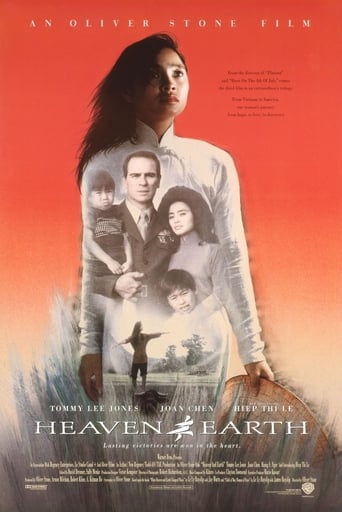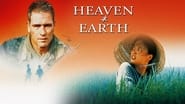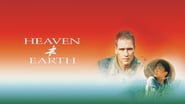escctrlshift
Much has been made of this film being a disappointment, a box office flop, or a nod in the direction of Buddhism, and so on. To my knowledge no reviewer here has yet made the point that, ironically or not, _Heaven and Earth_ is one important reason _Little Buddha_ sucked as badly as it did.Short back story: Bertolucci feared competition from another "Buddhist" film, as he feared Stone's production to be, so Bertolucci dumbed down the _Little Buddha_ script, rewrote scenes constantly, and rushed to market. This on a personal communication from one of the writers, who also happens to have an Oscar to his name, but not for _Little Buddha_, obviously.Anyway, I found this film hard to sit through the first few times. Eventually I realized why. The storytelling is, if you allow it, so powerful that even without showing violence directly, the impact of the _implied_ violence is almost overwhelming, even in spite of being (compared to Apocalypse Now, for example) relatively understated. Tommy Lee Jones' performance is powerful. But overall, the greatest feats are the writing, the cinematography and the direction.Heaven and Earth is a moral coup, low box office aside.
MisterWhiplash
As the third part of an unofficial trilogy of Vietnam films, Stone picked as the final point a good challenge for himself as making a film not only from a woman's point of view (1st time), but from the side of the "enemy" of the war he and Kovic fought in. Of course Vietnamese people were seen in Platoon and Born on the Fourth of July, but always as the "other", either in limited roles as the so-called enemy or as tragic figures of oppression. And yet despite opening during the Christmas season, it failed to connect with audiences.Seeing it now, finally, I can see why in some part; people from the West, Americans especially, wouldn't necessarily be interested in the point of view of someone who was on the side of the 'other', whether it's oppressor or oppressed (despite the attempted selling of the film on Tommy Lee Jones, audiences probably knew better that he wasn't the full star, more on him in a moment). It's one thing to see the point of view from the side of Americans, but for the other it's a tougher pill to swallow (maybe the exception is Letters from Iwo Jima, maybe), despite years after things are over and the wounds are beginning to heal. Maybe there's another aspect that is difficult to pinpoint but I could see it as Stone's, shall one say, spiritual side coming through which is his Buddhism, which is the religion of the protagonist Le Ly. How does one fully forgive and go for the belief in karma and past lives and so on? For me, this is a film that I could connect to simply on the grounds of it being a human portrait of a life lived through many, many beats. And in a way it makes sense from how the life story is told that it's the third part of a trilogy which began as a story of someone's life in the short term (the stint in combat), somewhat longer (from youth to awakening as a man full circle), and here it's from childhood to further as an adult. The life of Le Ly is at times dramatic... no, actually, it's brutal and unrelenting in its grimness. Le Ly's village is decimated and torn apart by war (not simply the Americans, though they certainly leave their mark, but the division between the two sides of the Vietnamese who bring equal hardship and misery and torture to Le Ly), and then when she has to leave with her mother to Saigon, as the story would say, "my troubles were about to begin".I'm tempted to say the first half of this may be TOO dramatic, in a sense, that things keep being thrown at Le Ly's way one after another: torture, rape, becoming an unwed mother on the streets, a dying (soon after dead) father, as well as a brother who was sent off to war and died. When I say 'heavy' it's more like an anvil is dropped. This is not to say the tone is always so heavy as far as being over-bearing - the emotion that's poured out in scene after scene by Hiep Thi Le is incredible, showing so much through her eyes as many a great actor can do. I think part of is is simply through Oliver Stone being... Oliver Stone, this coming as the "cool-off" between JFK and Natural Born Killers, so you can expect sometimes unwieldy camera-work and black and white flashbacks and the sort of intense lighting and compositions from Robert Richardson that, in a way, feel a little more out of place this time than in other Stone films of the period. The attempts to amplify the tension and horror (with the exception of one image, a big shock of fire going across the screen) are too much this time and clash with the otherwise strong, pretty straightforward direction of the dramatic scenes.Then we get into the second half when Tommy Lee Jones comes in, and it becomes a stronger picture. But his part in the film as well as everything that comes after does only work with that first half, if that makes sense; everything that Le Ly has endured and experienced, every moment that's forced her to be less foolish or ignorant or slow to understand something or naive makes her stronger so that when a strong, seemingly kind and generous man like Jones' Steve comes in, we get it. We know why she puts her guard up and why it goes down. And for Jones' part, as he has an arc as well as a man with a slowly-but-surely deteriorating veneer of strength through years of being a f***ed up "Psy-Ops" guy, he gives the performance that I'll just pretend he won the Oscar for in 94 instead of the Fugitive. It's really among his major performances, certainly one of the ones he should be remembered for, creating this man Steve as an engaging, fun, terrifying, wounded, tragic figure in Le Ly's life.I think that if Stone had reeled in some of his crazier stylistic tendencies of the period - he does, mostly, but not enough - and perhaps cut a little out (at 140 minutes it feels too long, mostly near the end, however necessarily in general it may be to complete Le Ly's arc), it would've been a film to stand with the rest of his work for the time. But as far as underrated films from a major director, this is one that is deeply felt and reveals someone who can deliver an experience outside of his usual worldview. At the same time it works as a feminist picture, a story of a woman making her own life on her own terms, while the spiritual side of things is always there. Though I wanted to like it more, I'd say if you want to finish Stone's oeuvre you won't be disappointed.




